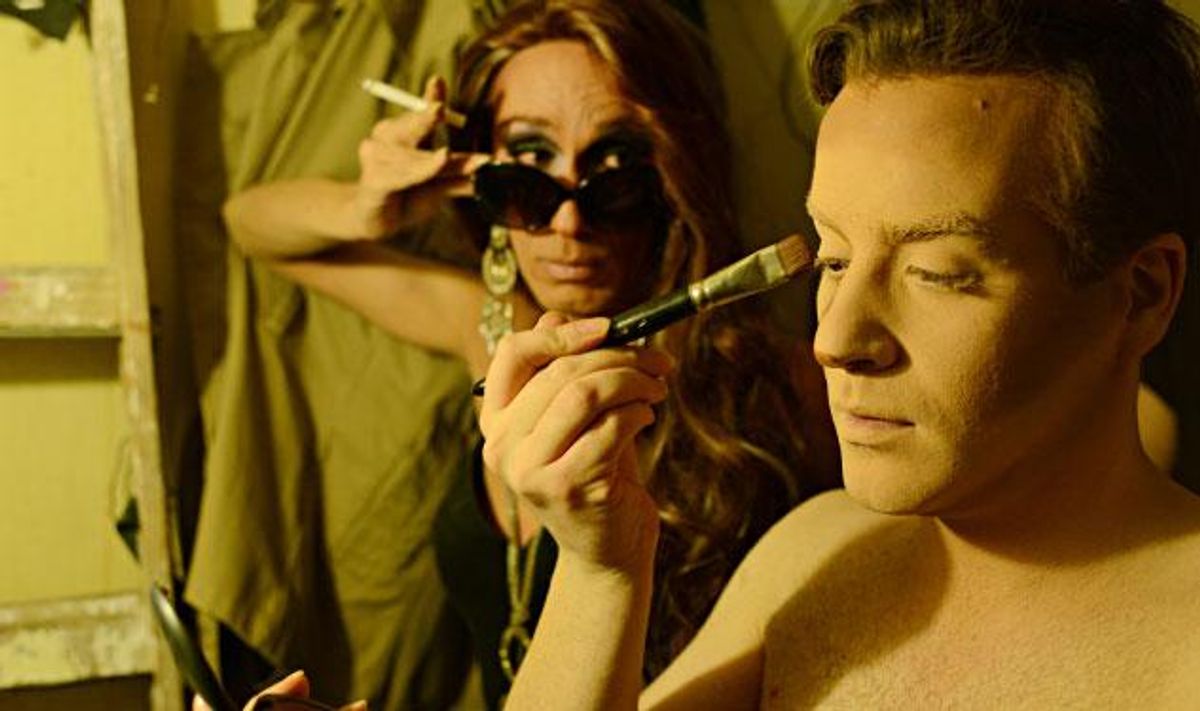Out Goes to Israel
Drag Queen in the Holy City

There's a reason Galina calls Jerusalem home.
October 17 2012 11:54 AM EST
February 05 2015 9:27 PM EST
By continuing to use our site, you agree to our Private Policy and Terms of Use.

Photograph by Daniel Tchetchik
My first question is about pronouns. I'm sitting backstage with one of Israel's most famous drag queens an hour before a Monday night performance, and she's more than a little distracted. "Which pronoun would you prefer?" I ask. She takes a long, dramatic puff of her cigarette. "Darling," she says, "call me whatever you like."
I'll call her Galina (her full stage name is Galina Port de Bras). "You'll notice I haven't shaved today," she says without embarrassment. "But my dress is floor-length, so no one needs to know." She points to an indigo gown hanging on the door, sparkling under the fluorescent light.
Galina is young -- only 29 -- but she's been performing for 11 years. While she may not be the originator of Jerusalem drag (that honor, she insists, belongs to Diva D, Galina's "drag mother"), she is arguably its best known. She performs here at least once a week, though she has many more performances in Tel Aviv.
Those shows in Tel Aviv, she tells me, keep the lights on. That city is the one she calls home these days, and, despite rampant "drag inflation," those shows are much more lucrative than performing here in her hometown.
She's fitting herself into a corset while simultaneously eating a falafel, somehow avoiding any smears of grease on her outfit. When I ask why she keeps performing in Jerusalem, she stops squirming into her voluntary prison and sets the food down. She looks at me with only half her makeup on, an effect that renders her response all the more arresting. "Look," she says. I look. "The people in Jerusalem are closed off in a way they're not in Tel Aviv." This is easy enough to verify. "But they need drag in Jerusalem more than they need it on the coast."
The coast -- Tel Aviv -- is unquestionably the center of Israel's gay scene, partly by choice and partly by circumstance. "They keep pushing us farther to the edges here," she says, referring to Jerusalem's well-documented shift to the political right over the past 10 years. That continued marginalization is why she (and Diva D, as it turns out) decided to move from Jerusalem to a tony neighborhood in Tel Aviv. But she keeps coming to the Holy City for these performances, no matter what. "I don't make nearly as much money here as I used to," she says, speaking with the kind of nostalgia usually reserved for a much older person. "In my 11 years performing, I've seen how this city has changed. But I'll keep coming here as long as I can."
She rattles off a list of American drag queens--"of course you know them," she says, citing at least 12 performers I've never heard of--with ease, then compares the scene in Jerusalem to that in the American South. She knows I'm from the Mississippi coast, and the aptness of her observations startles me. The gay community in New Orleans, for example, is smaller than San Francisco's. This, she argues, elevates its performers to a more respected, even familial, role, one that can't be matched in the big cities. But this closeness is also an element of small-town oppression. "We have a lot of closeted Hasids who come in here," she says, speaking of the ultra-Orthodox. "They're throwing rocks at us by day but singing along with Dana International by night," she says, referring to the transgender Israeli pop star.
When the interview is finished, she asks if I'll be staying for the show. "Of course," I say. "I can't wait."
"Good," she says with a wink. "I know you'll like the last song. It's in English."
The performance is excellent. Most of the songs are hometown favorites, Hebrew pop songs I find schmaltzy and altogether bad. Her showmanship, though, makes them bearable. That showmanship ferries us through the last song, maybe the most famous iteration of schmaltz yet written. It brings the house down. Her presence on stage is dazzling, yes, but what's best about this moment is how, behind me, the entire room full of people sing the words to "My Heart Will Go On" in an accent even odder than Celine Dion's.
Galina's indigo gown flashes under the stage lights while all manner of gay boys reach out to touch her hand, and it's then that I realize I'm singing, too. We're all swaying, hands on hearts, without shame. I think about what she told me backstage, and I think I understand it. "We're a family," she said. "And we all need each other, in this city most of all."